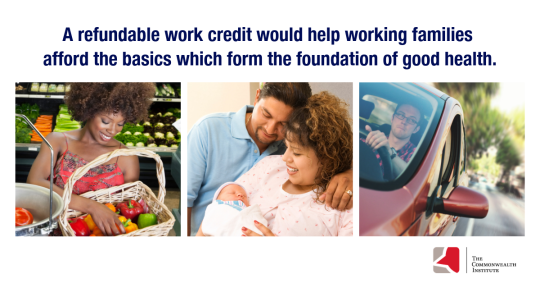January 25, 2019
Good Tax Policy is Good Health Policy: The Far Reaching Impacts of a Refundable Work Credit
Health care was clearly front and center during Virginia’s legislative session last year. And what some may not realize is that this year’s central debate – on tax policy – also has health implications. Our health is not only determined by getting to a doctor’s appointment, but by many other things as well, such as having stable housing, a warm home, and good food on the table. Governor Northam’s proposal for an improved, refundable state Earned Income Tax Credit (EITC) would help working families afford the basics which form the foundation of good health.

The federal EITC, which is refundable, is considered one of the most effective policies to support working families – lifting 5.8 million people, including 3 million children, above the poverty line annually nationwide. Virginia’s corresponding work credit, however, is not refundable, meaning many families only receive a portion of the credit they earned. The governor’s proposal ensures eligible families can claim the full value of Virginia’s work credit, similar to 23 states and the District of Columbia that have already adopted this policy, and would put money back in the pockets of working families.
This proposal is critical to the well-being of working families. Poverty has a negative impact on health in general, and growing up in poverty is associated with a range of health challenges, including physical disability, lower cognitive scores and altered brain development. Fortunately, the negative health impacts of poverty on young people in Virginia can be mitigated with a refundable Virginia work credit. Children in homes that receive an improved tax credit are less likely to suffer from early onset of disabilities and illnesses associated with child poverty.
Families, and particularly mothers, see health benefits from a larger tax credit. Mothers with two children that receive the EITC are more likely to see improved blood pressure. Additionally, EITCs refunds are associated with households consuming more fruits and vegetables upon receiving the credit.
A refundable working families tax credit has been linked to lower infant mortality rates and a decreased likelihood of low birthweight for children of families who receive the credit. In fact, research has found that the number of children born with low birthweight in Virginia would be reduced by 179 annually if a refundable EITC were implemented.
Making sure that working families receive the full value of their state credit will help these families buy healthy food, repair their car so that they can get to the doctor, and help keep a roof overhead.
A refundable credit will give a boost to communities of color, veteran and military families, and work to offset the regressive tax policy the state currently employs. It will also be a boost to the health of many working families. A refundable work credit is not only great tax policy but also an important investment in a healthy start for Virginia children and better health outcomes for young families in the commonwealth.
Categories:
Budget & Revenue, Health Care
